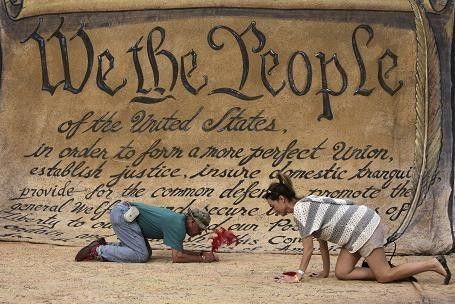Constitution Day: The 28th Amendment Will Move Us Closer To The American Promise

Today, on the 232nd anniversary of the signing of the United States Constitution, our nation is in crisis. The representative democracy promised in the Constitution is under threat. Last week a report delivered to Congress said 1,688 polling places have closed since 2013 in jurisdictions that, until a Supreme Court decision that year, were subject to federal elections oversight because of histories of voting discrimination.
Earlier this year a divided Supreme Court ruled that shaping political districts for partisan benefit is a political question the courts have no role in ending. Now the partisan majorities won via the billions of dollars pouring into our elections can then rewrite districting lines to ensure this purchased partisan control retains its power.
The 2020 elections are predicted to cost more than $10 billion, once again shattering past spending records. Most of this money will come from a tiny portion of Americans, global corporations, some big unions, and other undisclosed sources.
This happened because the Supreme Court, not the people, made up a new constitutional theory that money is just free speech and even the most global corporations have the same rights as Americans to “speak” with corporate money. A series of disastrous decisions reversed more than a century of law on how money is used in elections, including the Court’s ruling in 2010 that corporations and unions have a free-speech right to use unlimited funds to influence the outcome of elections.
The results of this reckless First Amendment distortion now are clear: Billions of dollars from the most partisan and self-interested elites drown out the voices of Americans, deprive voters of diverse views and candidates to choose from, block any compromise and action on overdue and urgent needs, and increase alienation and cynicism. A study by the Public Religion Research Institute found that Americans, by a 2-1 ratio, now believe our "vote does not matter because of the influence that wealthy individuals and big corporations have on the electoral process."
This is far from the first time our nation has faced a crisis of democracy. The Constitution’s framers completed their work in Philadelphia 232 years ago, but that was the beginning, not the end, of creating the architecture of our American republic. Nearly half of today's Constitution was not written in 1787 but was built by the people, all Americans, who have won 27 constitutional amendments, including a dozen in the 20th century.
Throughout our nation’s history, amendments—often driven by those whose rights were being denied—moved America closer to realizing the promise of our Revolution and our Constitution. Today, Americans are doing it again.
On this Constitution Day, dozens of legal scholars have called for a constitutional amendment to end the Supreme Court’s reckless experiment in forcing unlimited money into American elections, silencing the voices and concerns of most citizens and voters in the states. These include Harvard Law School’s Laurence Tribe and Laura Weinrib; Walter “Bud” Carpeneti, former Chief Justice for the Alaska Supreme Court; Adam Winkler, professor at UCLA School of Law; Caroline Frederickson, President Emerita of the American Constitution Society; and former Senator John McCain’s counsel Trevor Potter, and many more.
But lawyers and judges won’t get us out of the deep mess our nation is in now. Instead, we need the same people who used the constitutional amendment process to win the Bill of Rights, end slavery, mandate equal protection of the laws and voting rights regardless of race, and overturned disastrous Supreme Court decisons to win women and Americans over 18 years old the right to vote, among other milestones of our national experience.
Who were these superheroes? Everyday American citizens just like all of us today. They put aside partisan games, selfish interests and the understandable wish to avoid political engagement to rise to the challenge of building the national consensus and action needed for constitutional amendments.
Now, when the power of the few dominates the rights of the many, Americans are coming together once again to renew the Constitution through the amendment process. And a movement to make the amendment work after it is ratified already is building. After all, amendments make equal rights but those must be enforced: A century of civil rights struggle has been necessary and still is necessary to vindicate the 14th and 15th Amendments’ guarantee of political equality regardless of race.
Constitution Day celebrates the extraordinary promise of an American republic based on equal rights, human liberty and effective self-government. But no one can deliver on that promise but us, ordinary American citizens. A nation of ideals such as ours will rise or fall depending on whether ordinary people bring extraordinary courage and persistence to our political life.
American Promise is committed to an audacious goal: to bring Americans together to ratify a constitutional amendment, an amendment that will secure the equal rights of every American to free speech and real representation, and end the domination of unlimited, concentrated money that prevents solutions to every big problem in our nation.
Today, it is good to remember that all of us are called to defend and secure the Constitution and rights we rightly celebrate today.
Jeff Clements is the Founder and President of American Promise; Cheryl Crawford is the Executive Director of MassVote
© Copyright IBTimes 2024. All rights reserved.





















